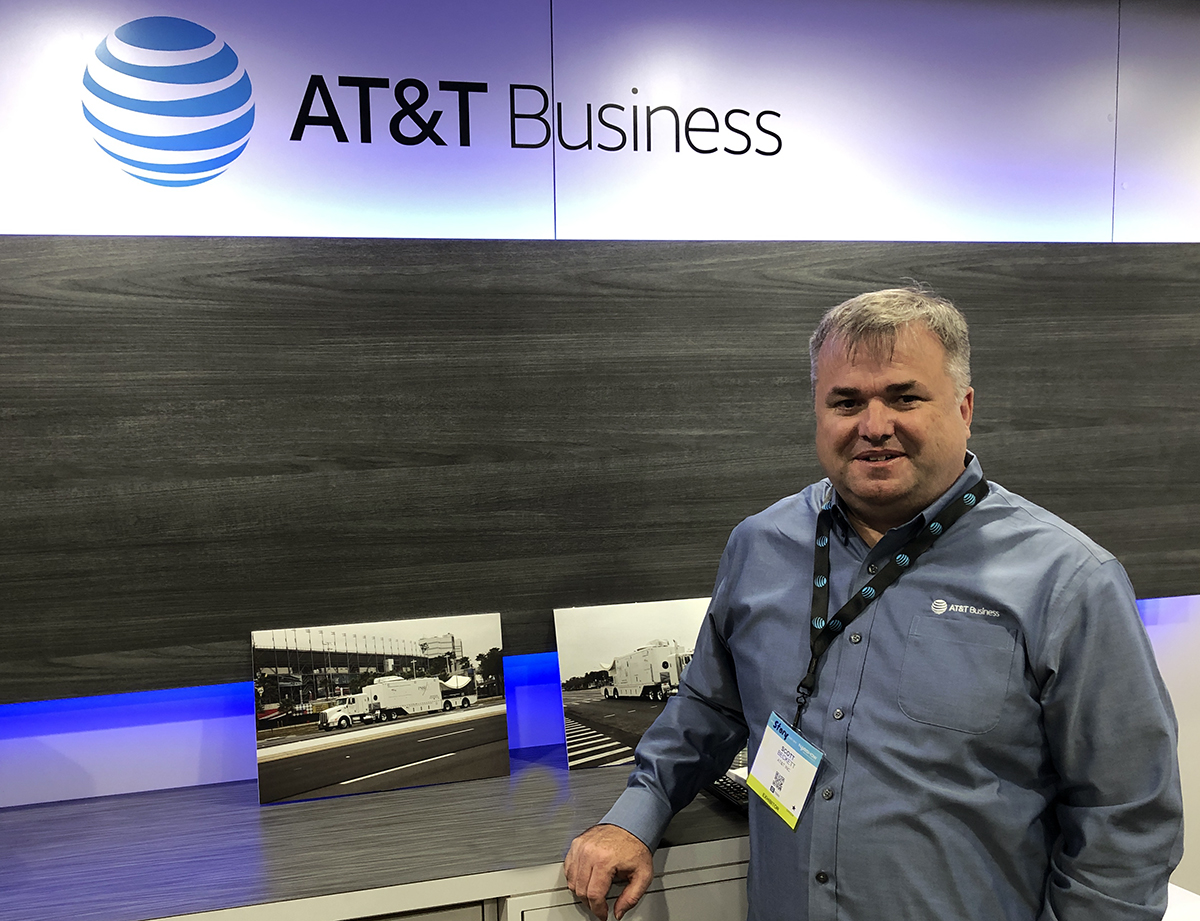NAB 2019 Reflections: AT&T’s Scott Beckett on 5G, At-Home Production, 4K HDR, 100G Connectivity
Sports is a major driver of interest in 5G
AT&T was back in Las Vegas this month for NAB 2019, and the company highlighted the latest developments from its Global Video Services team, which provides fiber transmission services with up to 400 or more points of presence for domestic and international sports and entertainment events. In addition, AT&T highlighted the latest offerings from its Video Managed Solutions division and previewed what is to come on the 5G front.

AT&T’s Scott Beckett: “We have a growing sports strategy. There are a lot of different aspects in which we can serve the sports market.”
SVG sat down with Scott Beckett, director of product management, Global Video Services, AT&T, to discuss the latest developments from GVS, how 5G is going to change live sports production, the explosion of the at-home production model and the company’s successful partnership with PSSI, the evolution of its Video Management Centers in New York and Atlanta, the rising demand for 4K HDR and 100-Gbps connectivity, and the promise of AI for AT&T’s customers.
What is AT&T showcasing at NAB 2019?
From the Global Video Services perspective, we’re focused on “media-connected.” We want to be part of the workflow, so we’re taking that big contribution feed and asking, What else can we do for you? We have connects into the hybrid cloud and various cloud providers, so we can provide several different services.
Here [at the booth], we are also [highlighting] our Video Managed Solutions, which is built on our QuickPlay acquisition and brings the contribution piece all the way out to OTT. They already support DirecTV Now, and we’re seeing a lot of excitement in that area.
Also, obviously, a lot of the conversation at NAB this year is focused on 5G, and we have [AT&T experts] speaking on several 5G panels, so we are definitely emphasizing how 5G can help the media industry.
AT&T is obviously one of the main drivers behind 5G. How do you see the technology enabling live sports productions in the future?
Everybody in the [M&E] industry is asking how can we do 5G? How can 5G help enable our broadcasts, help our productions, and also help reduce cost and improve efficiency? And sports is a big push for us in terms of 5G and beyond. We have a growing sports strategy and we want to make sure we’re promoting all of what AT&T does, not just the [Video Global Services segments] for stadiums. There are a lot of different aspects in which we can serve the sports market.
How have you seen the use of the at-home model for live sports production grow? How is AT&T playing a role in enabling these productions?
From our standpoint, [at-home] is the way to go, and everybody’s headed in that direction. Especially when you look at the smaller productions — not necessarily the huge NFL shows but smaller college productions — it makes a lot of sense. We want to support that as much as we can.
PSSI has been a great collaborator [on at-home production]. What we’ve been doing with PSSI now, instead of dropping a venue panel and putting our equipment into a stadium, we’re putting the equipment in a PSSI truck. So when that truck arrives, it is basically a small AT&T [connection point] with all the capacity that we would have at a [permanent venue installation]. Just think about it from an efficiency standpoint: that truck goes wherever the fiber handoffs are; once it’s connected, it’s on my network. Having the satellite uplink and having fiber together — that’s a great marriage.
How has the media market responded to the AT&T Video Management Center in New York City since you launched it in 2016?
It’s been really amazing. Interest just exploded, so we actually opened a second center in Atlanta. So we now have three: Manhattan, Atlanta, and Dix Hills [Long Island], which manages our core backbone. That gives us a nice geographic redundancy. We’re really excited about that part of the business and see a great future ahead from that standpoint.
Are you seeing more demand for 4K and HDR contribution services these days? Since DirecTV is leading the charge in terms of delivering 4K HDR to the home, what role can AT&T Global Video Services play in advancing the 4K HDR ecosystem?
Absolutely. We’re very focused on [4K]. Here at the show, Media Links announced [a new line of] 100G switches, and we’ve partnered with them. We are running 4K content connectivity over a 1G pipe using J2K across the network. From our perspective, we see the volume of 4K and 100G growing, so we’re starting to expand our core. And 100G is likely going to be the next generation of what we do.
Are there any particular trends or popular requests you’ve seen in the live-sports sector of your business lately?
We’ve had a number of requests asking what AT&T is doing in respect to the integration of AI. So that’s something that we’re definitely looking at. How can we help customers facilitate AI and machine learning? How can we reduce latency and move those capabilities closer to the venue? We’re having those discussions with our customers, and the interest has really exploded over the past couple of months.
This interview has been edited for length and clarity.

